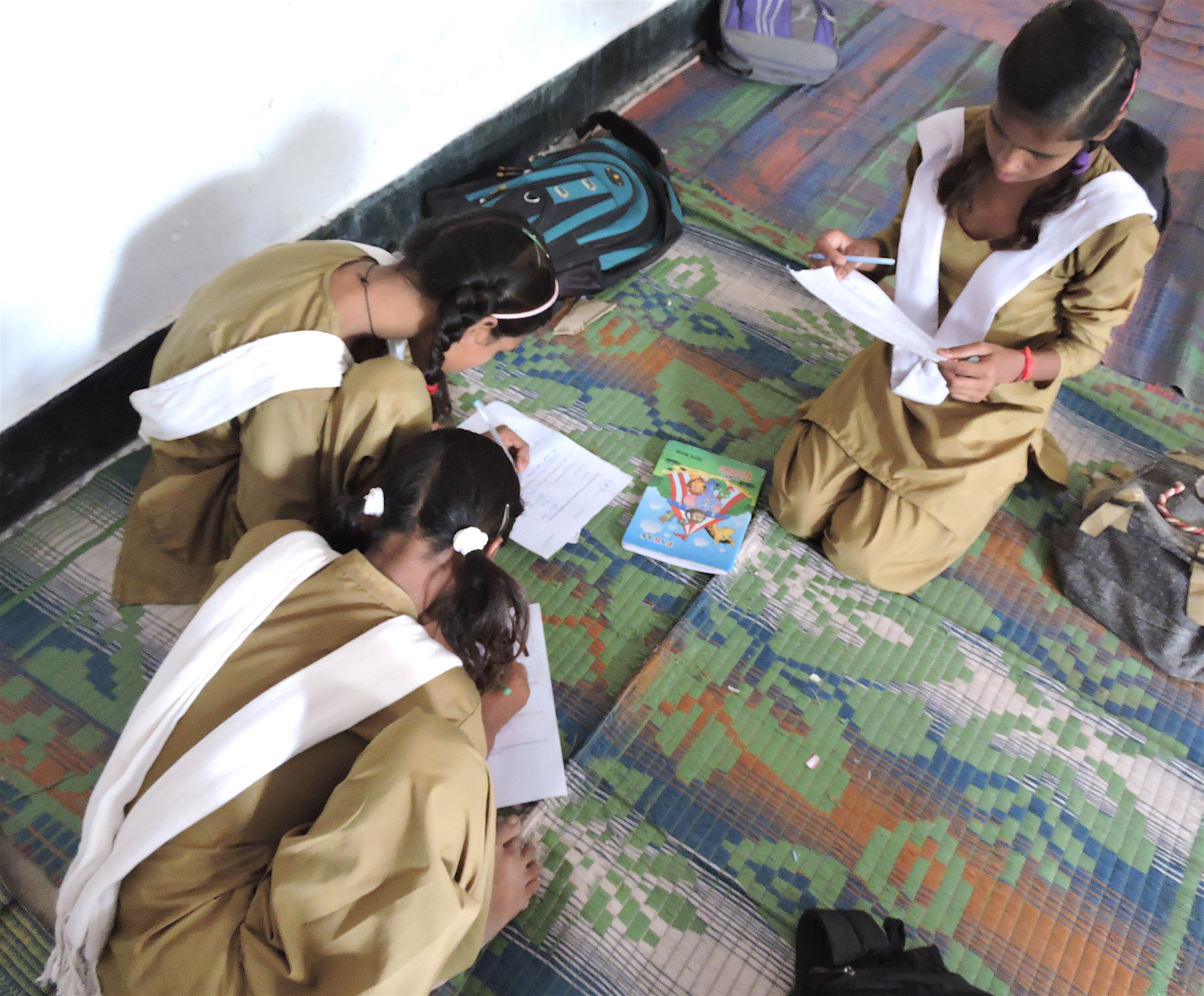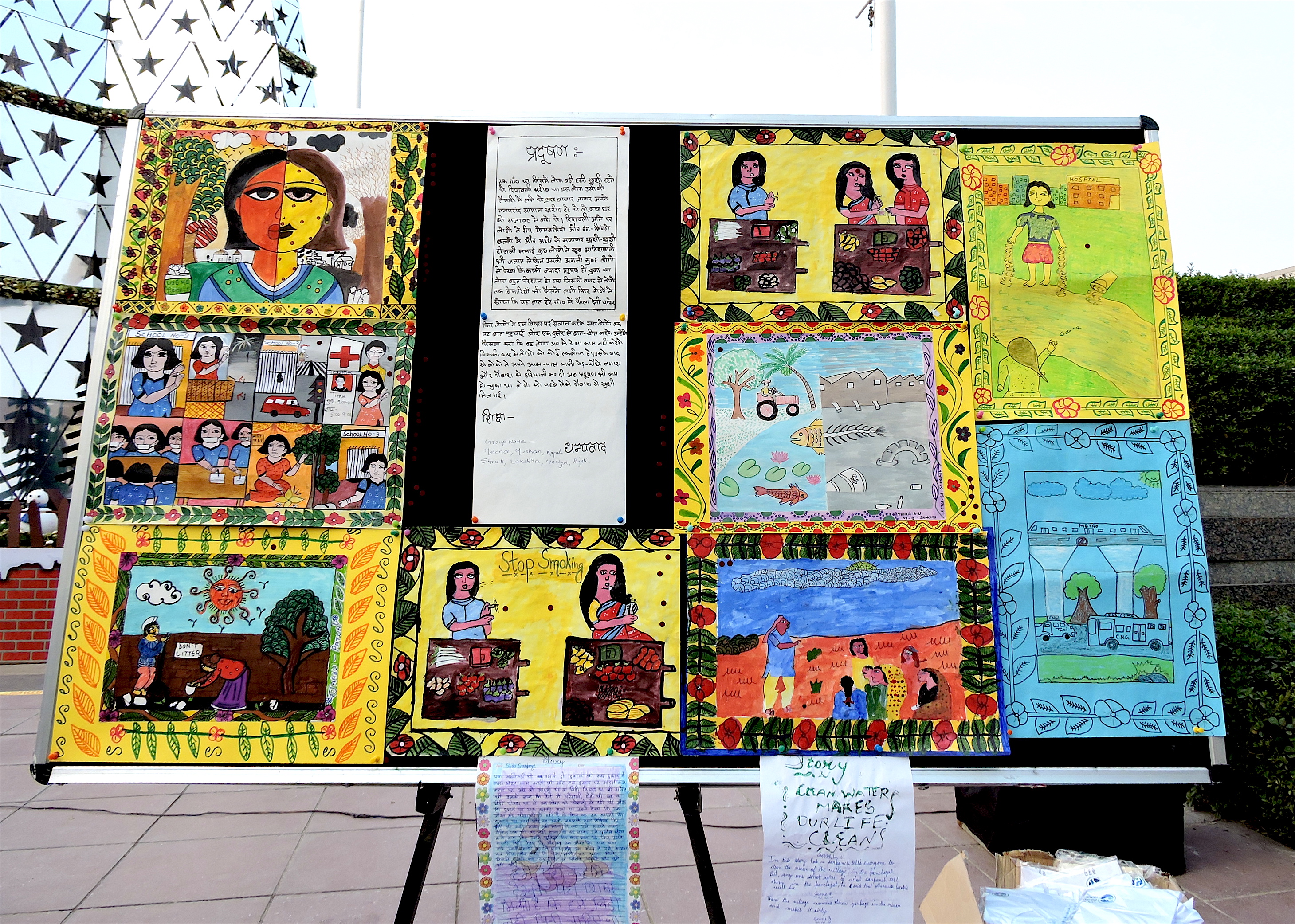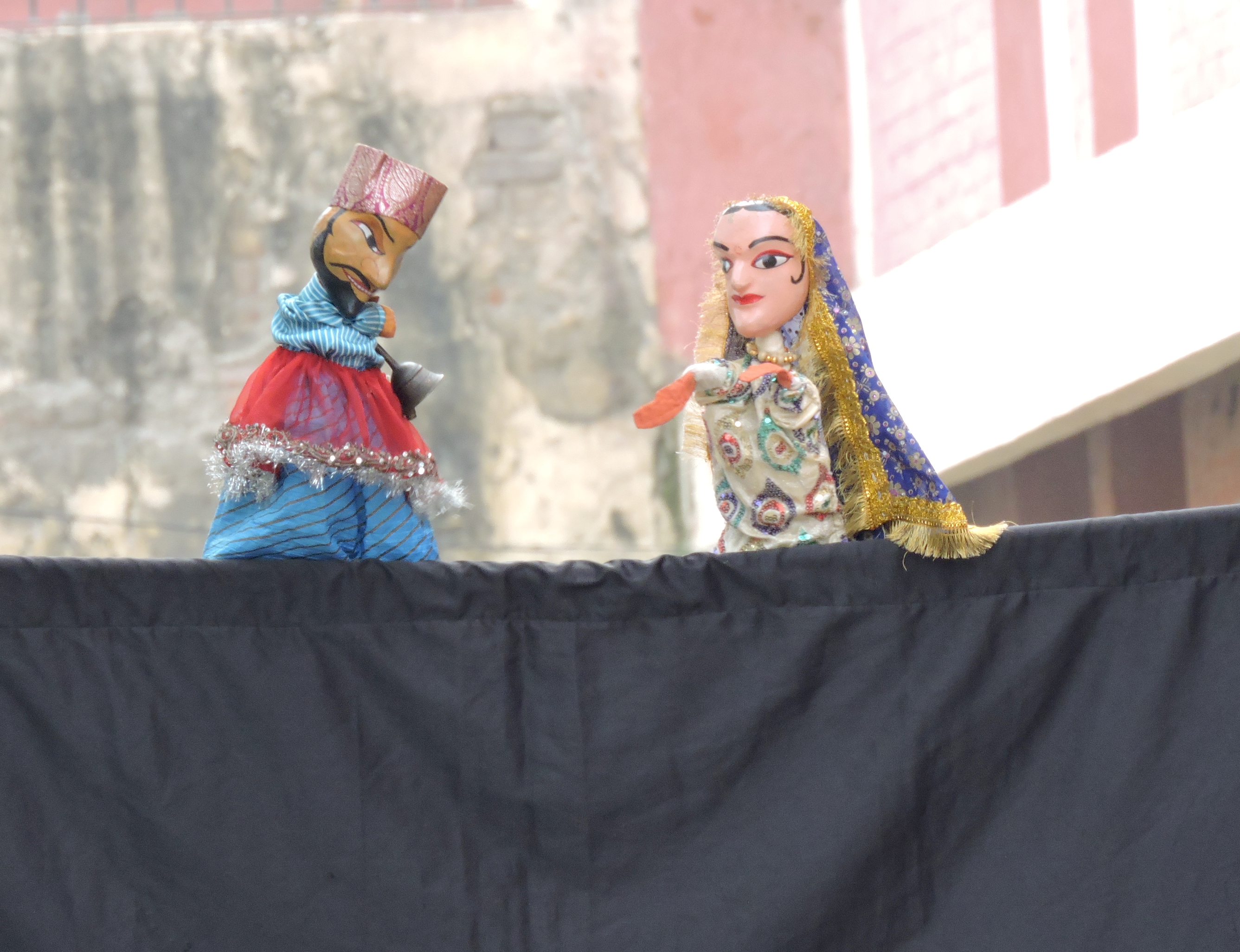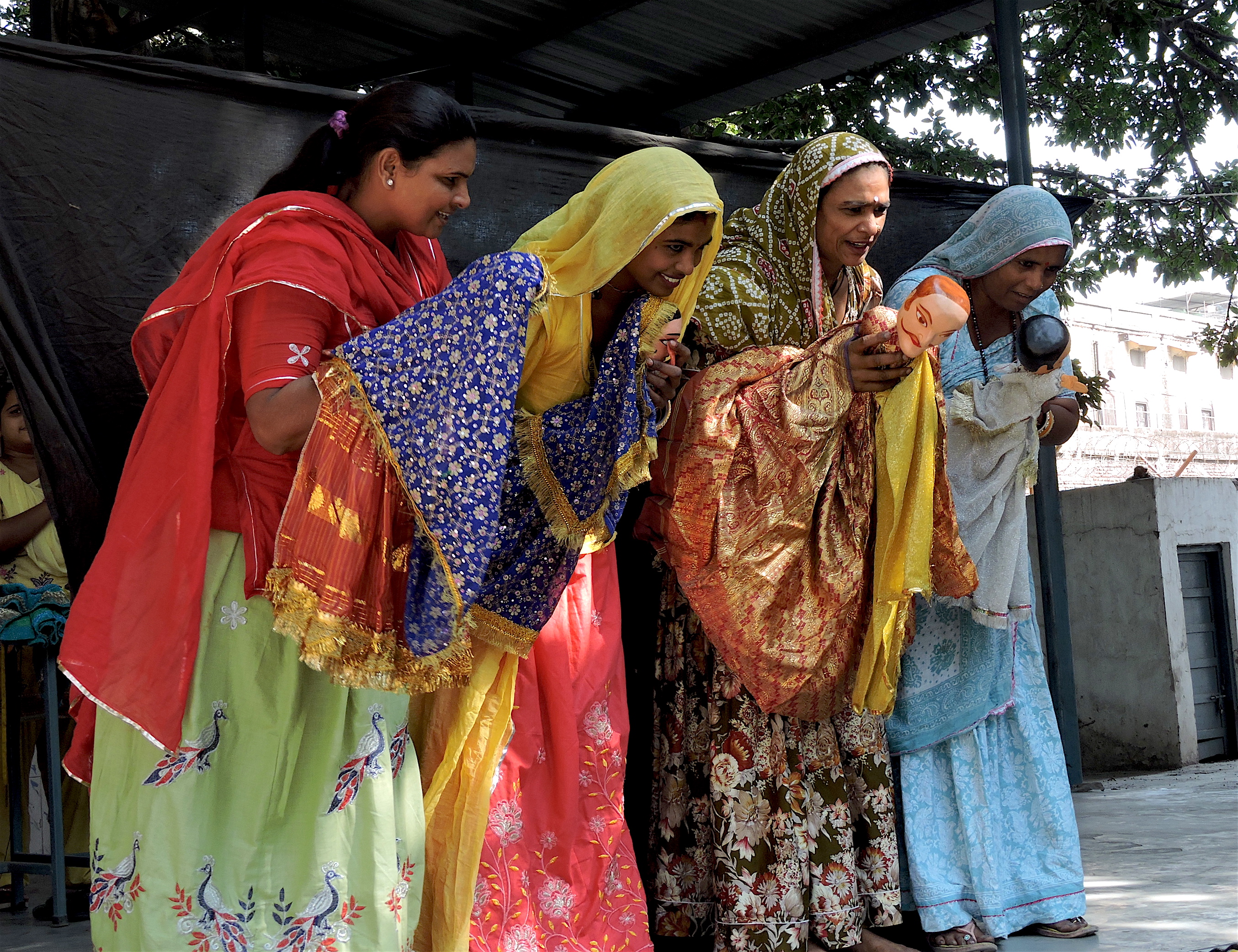Introduction
Historically, storytelling through arts and performance was commonplace for Indian audiences, both as forms of entertainment and as educational tools. Over time, education became more structured and formal with little space for the arts. In 2016, a grant from the Wellcome Trust–Department of Biotechnology India Alliance enabled the use of traditional story telling art forms in the classroom – this time for environmental health education.
Puppetry is a very old and popular form of folk entertainment and India has a rich heritage in it. Kathputli, string puppets of Rajasthan, have been used successfully to bridge entertainment and education on social issues like family planning and immunization. Patua is an ancient story telling technique of West Bengal, wherein storytellers travel from village to village with their scrolls, singing stories of popular gods and goddesses in return for money or food. These two art forms were combined to share knowledge of and encourage action to address some of India’s pressing environmental health issues with 5th and 6th graders from schools across Delhi, India.
The Objective
The World Health Organization estimates that 23% of the global disease burden can be attributed to modifiable environmental risk factors, with the burden disproportionately higher in developing countries like India. Air pollution is the number one risk factor for death and disability in India with 1.5 million deaths attributable to air pollution.
Our Environment, Our Health was conceived to raise awareness of India’s pressing environmental health challenges among school students; to encourage them to further spread awareness of these issues; and to encourage them to adopt healthy behaviors. Our approach was inclusive and participatory, enabling students to learn, discuss and respond to environmental health issues through a process of creative inquiry.
The Project
Puppetry is traditionally performed by men. Happy Hands Foundation, a non-governmental organization dedicated to preserving traditional Indian folk art and craft, had previously worked with the puppeteer community to change existing social and cultural norms to include women as performers. They recruited and trained women puppeteers in the art of storytelling. Our Environment, Our Health offered the women puppeteers opportunity to perform in public and hone their newly acquired skills, all while earning an income.
There is growing recognition among public health practitioners that unless there is ownership, sustained behavior change is difficult to bring about. To ensure that students were able to connect the puppet stories to their lived experiences, and to encourage them to adopt healthy behaviors, we asked that they share their own understanding of environmental health issues as stories using Patua art. Working with the teachers, Happy Hands facilitated the process of storyboarding using Patua art form in the different schools.
Puppets were used to engage students and teachers in dialogue about issues including sanitation, hand-washing, recycling, safe-drinking water, and air pollution. Based on their learning from the puppet shows, students created “story-boards” on environmental health-related themes of their interest, which included water pollution, air pollution, hand-washing, sanitation, and toxic exposures. Thus using puppetry as a trigger and Patua storyboards as a response medium, our methodology focused on promoting civic action, through engaged learning.
The two mediums of engagement were chosen based on previous experience of Happy Hands.
Beginning in September 2016, the women puppeteers developed plays which they performed in 15 public and private schools across Delhi-National Capital Region reaching approximately 2800 students (ages 12-14). To get them ready for the performances and help them draft the scripts of the puppet shows, Happy Hands team and PHFI researchers conducted training sessions with the puppeteers to help them understand and reflect on their personal concerns and experiences around environmental health issues. The women, who hail from Shadipur, a slum in New Delhi, were quick to identify problems such as open-defecation, garbage sorting and stagnant water. The training sessions helped the puppeteers develop visually impactful and interactive stories which were also scientifically sound. Use of triggers like questions and prompts not only made the shows interactive; they also allowed the students to actively engage in the learning process. For example, throughout the performances, students were encouraged to prompt the upcoming action a puppet should take.
The engagement activity culminated in a public awareness event organised at a popular mall in the city in mid- December 2016. The event focused on educating the public about the critical issue of air pollution in the Delhi-NCR region. The event was particularly important in light of the heavy smog that loomed over Delhi in November 2016, when air pollution levels in Delhi and neighbouring regions reached hazardous level. Over 500 visitors enjoyed performances by the women puppeteers and a play by the students of Salaam Balak Trust, an NGO working with street kids about the various measures that can be adopted to address the problem of air pollution. An esteemed panel of experts including researchers and doctors were at hand and welcomed questions from the audience. Close to 80 students who had created Patua-story boards from the 15 schools had the opportunity to see their artwork exhibited in a public display at the event. The event gave the students a platform to share their new learning about health through art and this was appreciated by the visitors.
Social media channels such as Facebook and Twitter became a parallel forum to discuss health and environment related responsibilities that every individual must adopt. Catalysed through photographs and Facebook videos from the puppet show, these channels successfully engaged more than 14000 people.
Evaluation
At the end of each show, students were excited and displayed enthusiasm about discussing the issues with their peers. Interestingly, in one of the schools, the performances pulled in crowds from nearby schools, with other schools requesting to host similar performances, thus highlighting the effective role of arts in education.
The Happy Hands team also conducted post-performance surveys to assess the impact of the puppet shows. Nearly 500 students responded to various questions about their own hygiene practices and shared their new learning from the show as well. More than half of the participating students had previously not known the importance of recycling and sorting garbage. In private schools, on the theme of hand-washing, the most common response was that students mostly resorted to dusting their hands off on their uniforms post a meal. In government schools, it was found that most students did not flush after using the washroom.
This public engagement project gave rise to unlikely partnership between a public health research institution, two NGOs working in the arts and social sector, and a biomedical research funding agency. We hope the partnership will be the first of many in India to bring complex yet important health issues and related research into public discourse.
About the Voices for Health
Voices for Health is an initiative supported by the Wellcome Trust/DBT India Alliance and implemented with technical support from the Public Health Foundation of India. The Voices for Health series was an effort aimed at engaging people and communities to better understand public health and to educate them about key determinants of emergent heath issues. This initiative was planned as a series of public engagement events that will bring together biomedical researchers with policy makers, social scientists, health workers, media and other stakeholders to talk about important health issues. Each event focused on a public health topic of contemporary interest. The series aimed to demystify science and myths, disseminate latest health research and share perspectives of experts and people. The series covered health issues such as antibiotic resistance, mental health, cancer and environmental health and held events in different Indian cities.
Our Environment, Our Health was part of the year-long Voices for Health Public Engagement series which was jointly organized by the Wellcome Trust/DBT India Alliance and Centre for Environmental Health at PHFI, New Delhi in 2016.
Caption: a video story on the Our Environment, Our Health engagement project
Partners
Happy Hands Foundation: Happy Hands Foundation is a non-government organization committed towards the revival of traditional/folk art and craft, empowering rural artisans and building potential in women and young people to lead community development activities and craft entrepreneurship.
Centre for Environmental Health at PHFI: The Centre was established in May 2016 to understand and address the environmental health disease burden in India. PHFI is a public private initiative and is a response to redress the limited institutional capacity in India for strengthening training, research and policy development in the area of Public Health.
Wellcome Trust/DBT India Alliance: The India Alliance is a visionary partnership between the Wellcome Trust, UK and the Department of Biotechnology (DBT), Government of India to support biomedical research in India through funding and engagement.
Authors
Rachita Gupta, Happy Hands Foundation,
Dr Kartik Sharma and Dr Banalata Sen, Centre for Environmental Health at the Public Health Foundation of India
With inputs from Dr Sarah Iqbal, Public Engagement Officer, Wellcome Trust/DBT India Alliance





Please Sign in (or Register) to view further.